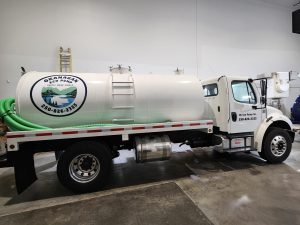Understanding how these systems function, recognizing signs of trouble, and knowing how to maintain them can save you from costly repairs and unexpected issues. This guide will cover the intricacies of septic systems and highlight common issues. It will also provide practical maintenance tips and explore alternative options for those considering upgrades.
Equipped with the proper knowledge, you can keep your home free from odors and worries.
Understanding Septic Systems
.jpg_00.jpeg)
Understanding septic systems is crucial for homeowners, as these systems are essential for managing wastewater in properties not connected to municipal sewage systems.
A septic system comprises a septic tank and a drain field designed to treat and disperse wastewater through biological processes, primarily involving anaerobic bacteria.
Being aware of how these systems function and recognizing the importance of routine maintenance can help prevent costly repairs and ensure effective wastewater treatment while complying with environmental regulations.
How Septic Systems Work
Septic systems operate by using a septic tank and drain field to treat and dispose of wastewater through anaerobic digestion. They provide effective wastewater treatment for homes lacking access to a sewer system.
In these systems, the septic tank serves as the primary treatment area, where wastewater settles to allow solids to form a sludge layer at the bottom, while lighter materials like grease rise to the top as scum.
These anaerobic bacteria thrive in this oxygen-free environment, breaking down organic matter and facilitating biological processes that help reduce the volume of waste. Enzymes play a vital role in this digestion process, enhancing the decomposition of complex organic compounds.
Following this initial treatment, the effluent flows into the drain field, percolating through soil layers. This natural filtration process, supported by microbial activity in the soil, further purifies the wastewater, allowing harmful pathogens and nutrients to be absorbed and treated before reaching the groundwater.
This process ultimately promotes a sustainable cycle of wastewater management.
Common Causes of Septic System Issues
Plumbing problems, clogs, and failure to adhere to maintenance protocols are common causes of septic system issues, which can lead to foul odors and harmful environmental effects.
The factors contributing to these failures often extend beyond mechanical malfunctions. One significant factor is improper waste disposal; flushing non-biodegradable materials or chemicals can disrupt the system’s balance. Overloading the septic tank by introducing more waste than it can handle may overwhelm its capacity, potentially resulting in backflow or leaks.
Regular maintenance tasks, such as inspections and pumping, are crucial for preventing issues. Homeowners can also engage in DIY maintenance by practicing mindful water usage and knowing what enters the system to support preventive care.
By remaining vigilant and proactive, you can significantly enhance the longevity and efficiency of your septic system.
Signs of Septic System Problems
Identifying signs of septic system problems early is crucial for homeowners to prevent costly repairs and ensure the system functions correctly.
Common warning signs to watch for include:
- Gurgling pipes
- Standing water
- Foul odors originating from drains or the drain field
Being attentive to these indicators can help maintain the efficiency and longevity of the septic system.
Identifying Warning Signs
.jpg_01.jpeg)
Identifying the warning signs of a failing septic system is crucial for homeowners. Issues such as gurgling pipes, slow-draining fixtures, and foul odors can indicate underlying problems that require immediate attention.
You should also remain vigilant for signs like pooling water in the yard, overly lush patches of grass, or unexplained wet spots, as these can signal potential leaks or system overloads. Observing these symptoms can help you catch potential failures early, allowing for timely intervention.
Effective treatment methods, like applying septic tank additives or scheduling regular pumping, can significantly enhance system performance and longevity.
Maintenance products that facilitate the enzymatic breakdown of waste and organic matter often play a vital role in preventing backups and system malfunctions, ensuring a properly functioning sewage system for your home.
Preventive Maintenance for Septic Systems
Preventive maintenance for septic systems is essential to prolong their lifespan and ensure efficient operation. Homeowners can achieve this by adhering to straightforward maintenance practices, such as applying a septic tank treatment annually. This treatment should contain powerful enzymes and live bacteria to promote effective waste management.
Regular Maintenance Tasks
Regular maintenance tasks for septic systems encompass routine inspections, pump-outs, and seasonal upkeep, all essential for mitigating the risk of costly repairs and ensuring the system functions effectively. Homeowners should pay close attention to pump-outs’ frequency, as this can vary significantly based on household size and tank capacity.
It is advisable to schedule these pump-outs in advance while monitoring usage to make informed decisions. Reminder services can help streamline the maintenance process and ensure no essential tasks are overlooked. These proactive measures not only enhance the efficiency of the septic treatment but can also result in substantial cost savings over time by preventing major system failures and extending the system’s overall lifespan.
Septic Safe Practices
Adopting septic-safe practices is crucial for homeowners to ensure their septic systems operate efficiently and avoid clogs. This includes using biodegradable products and being cautious with household items that may harm the system.
By being mindful of the products utilized in daily cleaning tasks and personal care routines, you can significantly reduce the risk of adverse effects on your septic system. For instance, harsh chemicals, antibacterial soaps, and products with high phosphate levels can disrupt the natural bacterial balance essential for effective waste treatment.
It is also important to avoid flushing non-biodegradable items such as wipes, feminine hygiene products, and cooking grease, as these can lead to significant blockages.
Instead, by opting for eco-friendly household goods, you support a healthier septic environment and contribute to a more sustainable household that positively impacts the planet.
Dealing with Septic System Issues
.jpg_10.jpeg)
When septic system problems occur, homeowners must take immediate action to protect their investment and ensure a healthy environment.
Seeking community support and guidance can facilitate effective solutions and enhance customer satisfaction.
Steps to Take When Problems Arise
When septic system problems arise, homeowners must follow a systematic approach to assessing them. This includes identifying plumbing issues, consulting with plumbing professionals, and implementing effective treatment options to restore functionality.
The first critical step is to observe any signs of trouble, such as slow drains, unpleasant odors, or wastewater backups, as these can indicate underlying system malfunctions.
Once these issues are identified, it is important to contact qualified plumbing professionals who specialize in septic systems for expert advice and a thorough inspection.
During this consultation, you should discuss potential treatment methods tailored to your specific problems, whether pumping the tank, repairing damaged pipes, or using bacteria-enriching products to promote healthier breakdown processes.
This proactive approach not only addresses current issues but also ensures the long-term health of your septic system.
Alternative Septic System Options
Exploring alternative septic system options is essential for homeowners, especially in areas where traditional septic systems may not be suitable.
These options include advanced wastewater treatment technologies that are environmentally friendly and can effectively manage waste for small farms and residential properties.
Exploring Different Types of Systems
Exploring various types of septic systems, including conventional systems, aerobic treatment units, and alternative eco-friendly options, highlights the range of wastewater treatment solutions available to you as a homeowner.
These systems differ in design and functionality, making it crucial to understand which system will best meet your needs. For example, conventional systems rely on gravity to move wastewater through pipes into a leach field, where the soil naturally filters contaminants. In contrast, aerobic treatment units use oxygen to break down waste more efficiently, making them suitable for smaller lots or areas with poor drainage.
Eco-friendly options, such as constructed wetlands, provide unique advantages by mimicking natural wastewater treatment processes while enhancing local ecosystems. Each type of septic system has its distinct features and is best suited for specific property types and environmental conditions, ensuring that you can select the most effective and sustainable solution for wastewater management.
Frequently Asked Questions
.jpg_11.jpeg)
What is odor-free, worry-free septic maintenance?
Odor-free, worry-free septic maintenance is a routine that keeps your septic system running smoothly and prevents unpleasant odors.
Why is it important to have odor-free, worry-free septic maintenance?
Proper septic maintenance is crucial for the health and safety of your family and the environment. Neglecting septic maintenance can lead to costly repairs and potential health hazards.
How often should I maintain my septic system?
Pushing your septic system every 3-5 years is generally recommended.
What are some signs that my septic system needs maintenance?
Some common signs include slow-draining sinks and toilets, gurgling noises in the plumbing, sewage backups, and unpleasant odors. If you notice any of these signs, it is important to schedule a maintenance appointment.
Can I perform septic maintenance myself?
While homeowners can perform some minor maintenance tasks, it is best to leave septic maintenance to professionals. They have the necessary equipment and expertise to properly maintain your septic system.
How can I prevent odors from occurring in my septic system?
Regular maintenance and proper usage of your septic system can help prevent odors. Avoid flushing non-biodegradable items down the toilet, and be mindful of what you put down your drains. Additionally, using septic-safe cleaning products can also help prevent odors.



